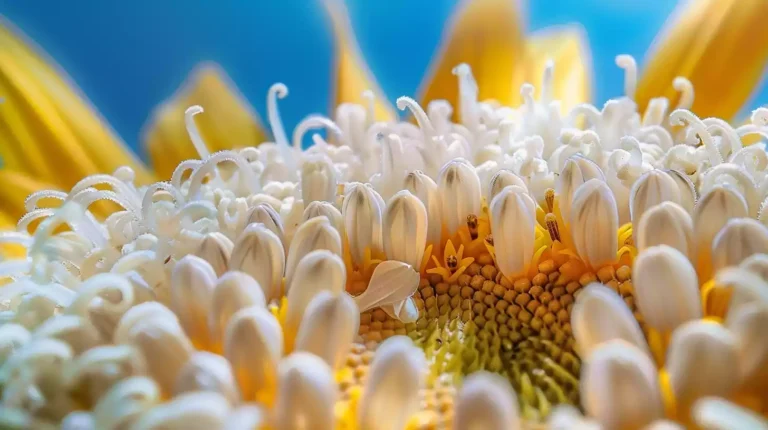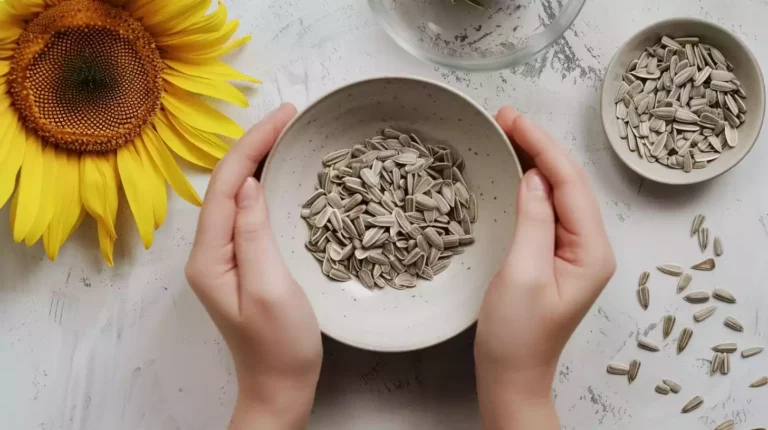Can Birds Eat Salted Sunflower Seeds?
I always believed all sunflower seeds were safe for birds until a friend mentioned the dangers of salted options.
While the question of whether birds can eat salted sunflower seeds seems straightforward, the answer might surprise you.
Understanding the impact of salt on avian health is crucial, and the potential consequences could shed light on the best choices for our feathered companions.
Continue Reading to Understand These Key Points:
- Salted sunflower seeds pose health risks to birds due to high sodium content.
- Opt for unsalted sunflower seeds to ensure birds’ well-being and prevent dehydration.
- Monitoring salt intake is crucial to prevent kidney damage and electrolyte imbalances.
- Choose nutrient-rich alternatives like safflower seeds for a balanced bird diet.
Nutritional Profile of Sunflower Seeds for Birds
Sunflower seeds are packed with essential nutrients like protein, healthy fats, vitamin E, and minerals, making them beneficial for birds’ health and energy levels.
Birds need a diverse diet to meet their nutritional needs, and sunflower seeds provide key nutrients. The protein in sunflower seeds supplies essential amino acids for bodily functions, while the healthy fats support energy reserves and overall vitality in birds.
Vitamin E in these seeds acts as an antioxidant, protecting cells and boosting immune function. Including sunflower seeds in a bird’s diet helps ensure they get vital nutrients for optimal health and well-being.
Added Risks of Salted Sunflower Seeds for Birds
Salt in salted sunflower seeds poses a significant risk to birds due to its potential to cause dehydration and disrupt electrolyte balance. This can lead to serious health issues, including kidney damage, which can be fatal, especially for small birds.
Opting for unsalted sunflower seeds or other seed varieties can help prevent these health risks and ensure the well-being of the feathered visitors in your yard.
Salt Impact on Birds
The risks of excessive sodium intake on avian health are well-documented, emphasizing the dangers of offering salted sunflower seeds to birds.
Birds have a low salt tolerance, and even a small amount can harm their health by causing dehydration, kidney failure, and disrupting their electrolyte balance.
Monitoring the salt content in foods given to birds is crucial to prevent harm and ensure their well-being.
Health Concerns Raised
Acknowledging the harmful effects of excessive sodium intake on birds, it’s important to note the health risks associated with feeding salted sunflower seeds to avian species.
These seeds often have high sodium levels, which can lead to dehydration and electrolyte imbalances in birds. Consuming too much sodium from salted sunflower seeds can increase the risk of kidney disease in avian species.
Overeating salted sunflower seeds may cause birds to miss out on essential nutrients in their diet, impacting their overall health. To address these health concerns, offering unsalted seeds or a variety of bird-friendly foods can help prevent the dangers of excessive salt intake in birds.
Alternative Seed Choices
Opting for unsalted raw sunflower seeds offers a healthier and safer seed choice for feeding birds, reducing the risks associated with salted sunflower seeds. Unsalted raw sunflower seeds provide various benefits for birds:
- Health Benefits: Raw sunflower seeds are packed with nutrients like vitamin E, promoting bird health.
- Bird-Friendly: Choosing unsalted raw seeds supports bird well-being without the drawbacks of salt consumption.
- Safety: By avoiding salted sunflower seeds, you can help prevent dehydration, electrolyte imbalances, and kidney issues in birds.
Dangers of Too Much Salt for Birds
Excessive salt intake poses severe health risks for birds, including dehydration, electrolyte imbalances, and potential kidney failure. Birds are particularly sensitive to even small amounts of salt, making salted sunflower seeds a dangerous choice for them.
These seeds can contain high levels of sodium, sometimes reaching up to 170 mg per ounce, leading to detrimental effects on birds’ health like dehydration and electrolyte imbalances. Even human-consumption roasted sunflower seeds, due to their salt content, shouldn’t be given to birds.
It’s crucial to be aware of the dangers of too much salt for birds and avoid providing them with salted seeds to ensure their safety and well-being. By steering clear of offering foods with potentially lethal levels of salt, bird enthusiasts can help protect their feathered friends from unnecessary harm and health complications.
Healthier Alternatives to Salted Seeds
When it comes to providing healthier options for birds, opting for unsalted raw sunflower seeds over salted varieties is crucial to their well-being.
Including nutrient-rich alternatives like safflower seeds and chia seeds in their diet can offer a wide range of benefits.
Ensuring a balanced diet with these bird-friendly choices promotes optimal health and prevents the potential risks associated with salted seeds.
Nutritious Seed Options
To support optimal bird health and nutrition, considering nutritious seed options like unsalted raw sunflower seeds, safflower seeds, and chia seeds is crucial.
Unsalted raw sunflower seeds offer essential nutrients without the harmful effects of added salt.
Safflower seeds, with high protein content and thin shells, provide a nutritious choice for birds’ health.
Chia seeds, rich in omega-3 fatty acids, fiber, and antioxidants, can contribute to overall bird well-being.
Including a variety of bird-safe foods in their diet helps ensure a well-rounded nutritional intake.
Choosing these healthier alternatives to salted seeds can positively impact the bird’s health and nutrition.
Bird-Friendly Seed Choices
Selecting unsalted raw sunflower seeds is crucial for enhancing avian health. Here are key points to consider:
- Health Benefits: Unsaturated raw sunflower seeds provide optimal nutrition for birds.
- Avoid Salted and Roasted Seeds: Salted and roasted seeds can harm birds due to their high salt content.
- Emphasize Moderation: While a popular choice, offer sunflower seeds in moderation to maintain a balanced diet for birds.
Bird Species Most Sensitive to Salt
Among avian species, certain small songbirds are particularly vulnerable to the effects of excessive salt intake, making them more sensitive to salt than other bird types.
Finches, canaries, and budgerigars fall into the category of salt-sensitive bird species. These birds are more prone to experiencing sodium toxicity if they consume salted sunflower seeds.
Sodium toxicity can manifest in these species through various signs, including excessive thirst, weight loss, weakness, and lethargy. Bird owners must avoid feeding salted sunflower seeds to these delicate species to prevent potential health issues related to sodium toxicity.
If any of the mentioned signs are observed in salt-sensitive birds, prompt veterinary attention is highly recommended to address the situation effectively and ensure the bird’s well-being.
Being aware of the vulnerability of these bird species to salt can help bird enthusiasts make informed decisions when it comes to selecting suitable dietary options for their feathered companions.
Signs of Sodium Toxicity in Birds
Recognizing signs of sodium toxicity in birds is crucial for ensuring their well-being and prompt veterinary intervention when necessary.
Birds sensitive to salt, such as finches, canaries, and budgerigars, may exhibit signs of sodium toxicity if exposed to excessive sodium levels. Common signs include excessive thirst, weight loss, and weakness and lethargy.
Birds may drink more water to dilute the excess sodium, experience a decrease in appetite leading to weight loss, and appear weak and lethargic due to high sodium levels impacting their health.
To prevent these symptoms, provide a balanced diet without high-sodium foods to salt-sensitive bird species, ensuring proper nutrition and avoiding excessive sodium intake for their well-being.
Can Birds Eat Roasted Sunflower Seeds?
When considering the dietary options for birds, it’s crucial to evaluate the potential risks associated with feeding them roasted sunflower seeds due to their high sodium content and possible inclusion of harmful preservatives.
Birds that eat sunflower seeds may consume roasted sunflower seeds, but caution is advised.
Roasted sunflower seeds can contain dangerous levels of sodium, with a single ounce containing around 170 mg. This high sodium content could lead to sodium toxicity in birds, causing adverse health effects. Additionally, some roasted sunflower seeds may have preservatives that are harmful to birds.
Sharing roasted sunflower seeds with birds isn’t recommended due to these potential risks. It’s essential to prioritize the well-being of our feathered friends by offering them safer and more natural food options to ensure their health and happiness.
How Do Birds React to Sesame Seeds?
After considering the potential risks associated with feeding birds roasted sunflower seeds, it’s evident that sesame seeds aren’t a common or preferred dietary option for most bird species due to their lack of nutritional value.
When it comes to sesame seeds, birds typically exhibit the following reactions:
- Not a Preferred Food Source: Birds don’t typically consume sesame seeds as they aren’t a common part of their diet.
- Lack of Nutritional Value: Sesame seeds lack the nutritional value that birds seek in their natural diet, which may lead them to ignore or avoid these seeds when offered.
- Better Alternatives: Offering bird-friendly seeds like sunflower or millet is more likely to attract and benefit birds as these seeds provide the necessary nutrients that support avian health and well-being.
Are Poppy Seeds Bad for Birds?
Poppy seeds are generally considered safe and nutritious for birds when consumed in moderation. These tiny seeds provide essential nutrients such as protein and fats, making them a valuable addition to a bird’s diet.
Birds can benefit from the nutritional content of poppy seeds, enhancing their overall health and well-being. Birds may enjoy foraging for poppy seeds as a natural and engaging activity, stimulating their natural instincts.
Offering a variety of seeds, including poppy seeds, can enrich the feeding experiences for birds, providing both sustenance and mental stimulation.
When considering incorporating poppy seeds into a bird’s diet, moderation is key to ensure a balanced intake of nutrients without overconsumption. Overall, poppy seeds are a beneficial and safe option for birds, contributing to their dietary diversity and overall nutritional intake.
Final Thoughts
It’s vital to prioritize the health of our feathered companions by avoiding salted sunflower seeds and choosing unsalted varieties instead.
Salt intake in birds can lead to serious health issues, so opting for bird-friendly foods like unsalted sunflower seeds is crucial for their well-being and longevity.
A little salt can be harmful to our avian friends, so let’s ensure they stay safe and healthy with the best nutrition possible.






